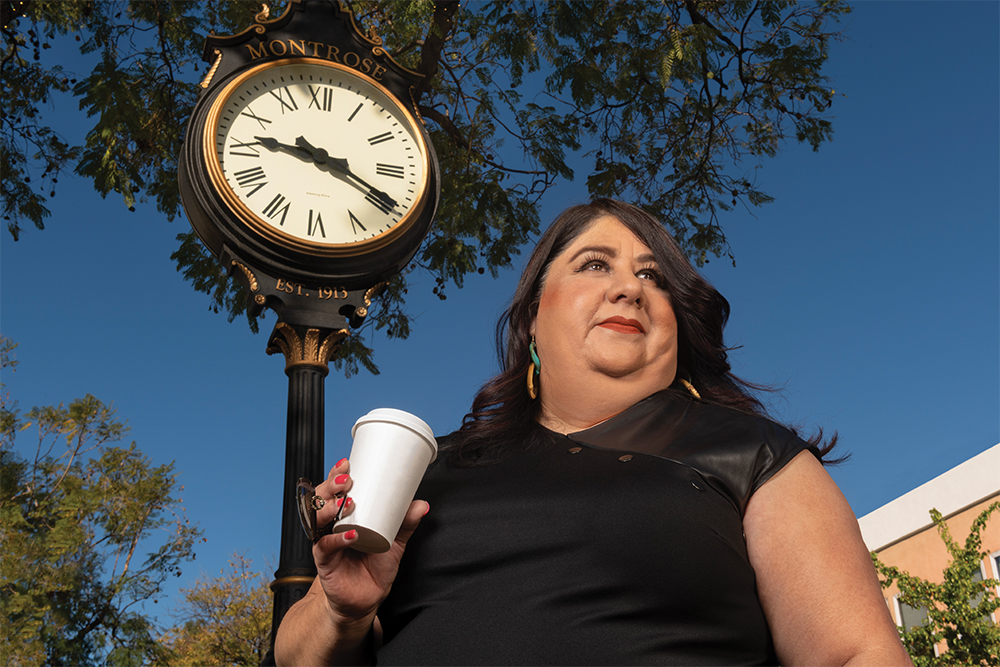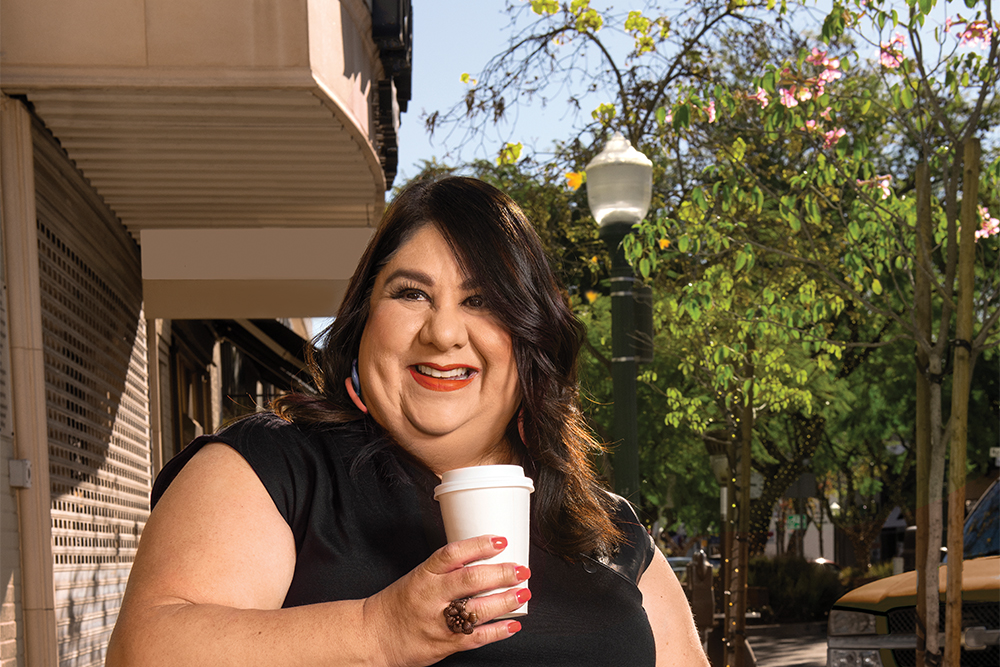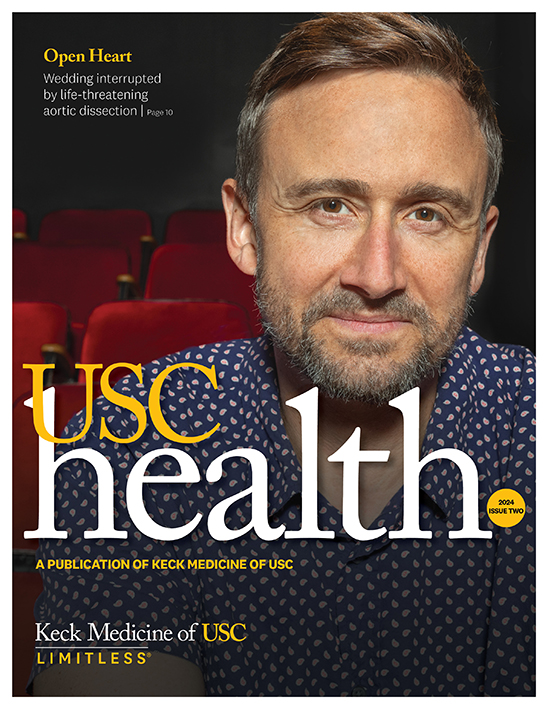
Natalie Ciebrant credits Keck Medicine of USC cardiothoracic surgeon Fernando Fleischman, MD, for safely treating her aortic disease while respecting her faith.
When Fernando Fleischman, MD, met Natalie Ciebrant, she had already been diagnosed with an aneurysm and seen physicians at two major hospitals. Despite the gravity of her condition, she couldn’t find a doctor who would treat her.
But within two weeks, Dr. Fleischman and the team at Keck Medicine of USC — which includes the USC Comprehensive Aortic Center and offers transfusion-free services — were able to bring Natalie back to the recovery room to begin the rest of her life.
Natalie is a Jehovah’s Witness, which means that she could not receive a blood transfusion and stay true to her faith. For many surgeons, this is beyond their expertise, but Keck Medicine offers a full program dedicated to providing patients with advanced care and without blood transfusions.
“Had I known that Keck Medicine has a program like this, they would have been my No. 1 pick,” Natalie says.
Searching for transfusion-free surgical care
In January 2021, Natalie was rushed to an emergency room in Upland with trouble breathing and high blood pressure. She was terrified because she was at the hospital in the middle of a pandemic surge and coronavirus precautions barred her husband Ray from going in with her.
After a CT scan, the surgeon told her she had a large aneurysm and needed surgery that very day. When Natalie explained that she couldn’t receive a blood transfusion and stay true to her faith, “He threw up his hands,” she remembers.
The surgeon told her that the procedure would be impossible without a blood transfusion and that she would die without it. He told his staff to get her blood pressure down and when she was discharged the next day, they told her to avoid salty foods.
“To be told you’re not going to live is the scariest thing,” she says. “No surgeon in my area could take this on.”
When she received a referral to a surgeon who could repair her aneurysm without a transfusion, it took nearly three months just to get all the insurance approvals. In the meantime, Natalie’s circulation became extremely poor.
“I knew I was dying,” Natalie says. “I can take a lot of pain, but for almost a whole year, people told me my skin was blue.”
Natalie finally was scheduled for an initial procedure with the other surgeon in April 2021, but because the surgeon was the only one at the hospital who could perform the procedure, it was canceled the day before, three times in a row.
“I wanted to give up,” Natalie says. “I had no energy. I said, ‘I’m going to die. Just let me go.’”
But her husband Ray had no intention of letting her go, and in the meantime they learned about the transfusion-free program at Keck Medicine — a full, integrated program with staffers who are experienced in transfusion-free procedures.
Transfusion-free surgery option offers Natalie new hope
The transfusion-free program was started 25 years ago with Jehovah’s Witnesses in mind. Initially, the program was for transplant recipients, but the program has grown to include a full range of surgical procedures, with caregivers who are trained for and experienced with transfusion-free protocols.
Ray called Alexander Perez, the manager of transfusion-free services at Keck Medicine. Perez has worked with many patients who are Jehovah’s Witnesses and is knowledgeable about their needs. He worked to get Natalie into Keck Medicine’s USC Cardiac and Vascular Institute, where she could be seen by the clinicians at the USC Comprehensive Aortic Center quickly.
As it was, though, Natalie was exhausted. “I couldn’t breathe. I couldn’t walk. I thought we had waited too long,” she says. But the USC Comprehensive Aortic Center’s Sophia Lam, MSN, CNS, ACNP-BC, wouldn’t let her give up.
“Sophia was like my little conscience on my shoulder,” Natalie says. “I was scared, but she kept saying that I could do this, and I was going to get better. She said I had such a good doctor, and that I would be all right. Everyone in the office was so wonderful.”

Specialists in care for aortic aneurysm
When Dr. Fleischman, co-director of the USC Comprehensive Aortic Center and associate professor of clinical surgery at the Keck School of Medicine of USC, first saw Natalie, he knew it could be a challenging case.
But the center has a dedicated team of specialists who treat all aspects of aortic disease, including aneurysms and emergencies like aortic dissections. The center’s caregivers are used to taking complex cases from other institutions across Southern California.
Dr. Fleischman’s expertise allowed him to discover something the other doctors had not: Natalie’s aortic root was damaged. It was under pressure and pulling away from her heart, which was why Natalie felt like she couldn’t breathe — her condition was drastically reducing her blood flow.
Natalie’s case was serious, especially under transfusion-free constraints.
Dr. Fleischman is the best doctor! He told me, ‘You’re going to make it. You’re going to feel good again.
Natalie Ciebrant, patient, Keck Medicine of USC
“Heart surgery is by definition a blood-intensive surgery,” Dr. Fleischman explains. But he was also moved by Natalie’s story, which is typical of Jehovah’s Witnesses, who often get turned away from several hospitals before they are able to find advanced care.
“I knew she was high-risk,” he says, “But I also knew that I have the skills and experience to do a procedure like this, and I have our whole program here to support me. Not everyone has that. If I turned her down, where was she going to go?”
“Dr. Fleischman is the best doctor!” Natalie says. “He was so calm. He told me, ‘You’re going to make it. You’re going to feel good again.’” Dr. Fleischman walked Natalie through the procedure and gave her an exact list to go through with her church elders to make sure every aspect was in line with her beliefs.
Natalie also completed a form with the transfusion-free services program so that she could make her wishes known about, for example, blood substitutes or products derived from blood components.
Life after transfusion-free surgery
Physically, Natalie prepared for the surgery by taking blood builders, a bone marrow stimulant and a “cocktail” of iron, folic acid (vitamin B9), and vitamin B12 to raise her blood count and correct any anemia.
After her blood was optimized, Natalie’s blood volume was deliberately decreased to reduce potential bleeding. And then, Aug. 2, 2021, she was finally scheduled for her open-heart surgery.
Dr. Fleischman worked cautiously and meticulously, using surgical techniques to prevent bleeding and avoid the need for transfusion. He repaired the aneurysm and replaced Natalie’s aortic root with a graft. The procedure went well.
“I knew it was going well because there was no bleeding,” Dr. Fleischman says, “but I waited 8 to 10 hours and checked in to make sure that her blood was flowing well.” He was pleased with how the procedure went.
“I just remember waking up and I could breathe!” Natalie says. “I can take a deep breath and breathe the air. I can walk now.” Natalie is back to work now, and she can enjoy her favorite pastimes: shopping, watching movies and cooking. Weekends are the best — she and Ray like to take a drive and enjoy the beach or a walk outdoors.
“They saved my life,” Natalie says. “I had so much fear in me and everyone there put me at ease. They made me believe that I was going to live.”
Topics


